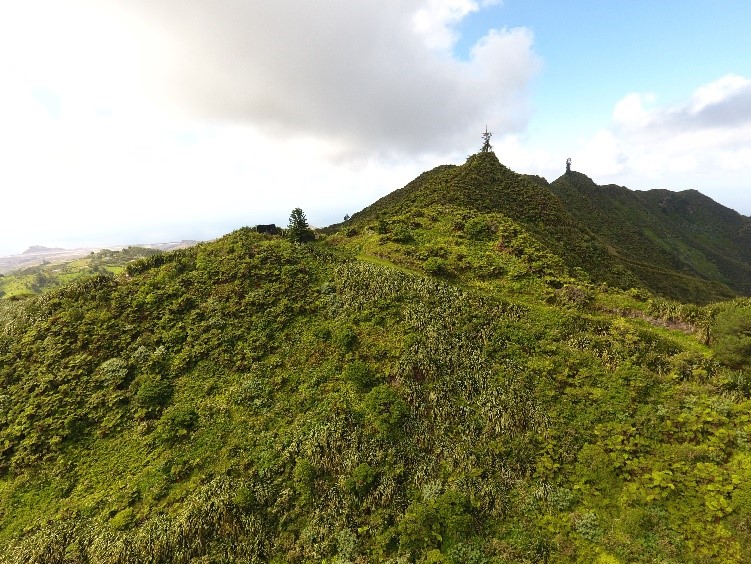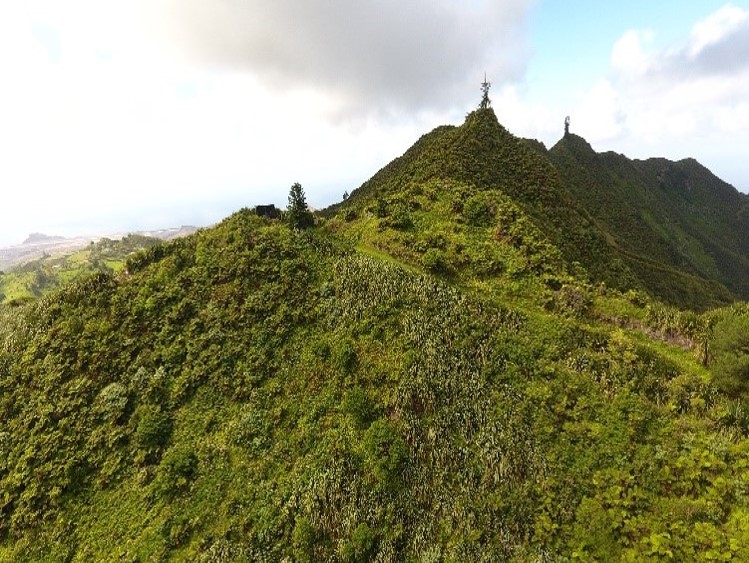26 May 2021
- St Helena Research Institute to work with the Birmingham Institute of Forest Research
- Study to focus on an emerging pest to the Island’s endemic cabbage trees
- Study aims to improve disease management for cabbage tree conservation and future forest health
The St Helena Research Institute (SHRI) is delighted to be working with Professor Rob Jackson of the Birmingham Institute of Forest Research (BIFoR https://www.birmingham.ac.uk/research/bifor/index.aspx ) to study an emerging pest to the Island’s endemic cabbage trees. The cabbage trees on the Peaks have been dying from an unknown cause. Branch die back, leaf drop and sudden tree death have been witnessed across all of the cabbage trees (Melanodendron integrifolium, black cabbage; Pladaroxylon leucodendron he cabbage; Petrbium arboreum, whitewood and Nesohedyotis arborea, dogwood) in senile and mature specimens, both wild and planted. This study aims to improve disease management for their conservation and future forest health.

View of the Peaks taken from a drone by Ross Henry from the Environmental Management Division’s Darwin Project funded team controlling invasive plants amongst the tiny fragments of remaining habitat where old cabbage trees survive.
The cabbage trees are restricted to the Island’s upland cloud forest habitat, found only on the highest peaks and ridges where rainfall is high and the frequency of mist and fog maintains high levels of humidity all year round. All this water has resulted in St Helena’s cloud forest being incredibly rich in endemic biodiversity. It is an area of global conservation importance and one of the UK’s most biodiverse regions. We know that the area supports over 250 unique species that are restricted or almost entirely restricted to the area and it is likely that there are more species yet to be discovered. The cabbage trees are perfectly adapted to this high rainfall environment, their form and leaves provide a large surface area upon which water falls and condenses, dripping off leaf tips or channelled down along branches and trunks to the ground below. Rare ferns, liverworts and mosses grow along branches and on trunks. The Peaks cloud forest provides almost 40% of the Island’s water, 60% of which has come from mist.
The doctoral study is fully funded by BIFoR which was established in 2014 at the University of Birmingham following a £15 million philanthropic donation. BIFoR aims to provide fundamental science, social science and cultural research of direct relevance to forested landscapes anywhere in the world. The two main foci are to investigate the impact of climate and environmental change on woodlands, and to study the resilience of trees to invasive pests and pathogens.
Professor Rob Jackson said:
“I joined BIFoR as a Director in 2020 and since then have been establishing my group to study tree diseases. I am interested in how pathogens cause disease, specifically in the mechanisms they employ to evade host resistance and cause disease, how they evolve and approaches to controlling the disease. I am delighted to have this opportunity to work with Dr Cairns-Wicks and SHRI to tackle this important problem. We will lay the foundations for future research and new management practices to improve the health and resilience of the trees.”
SHRI Coordinator, Dr Rebecca Cairns-Wicks added:
“We’re really excited to be working with Professor Rob Jackson and BIFoR. We reached out to the British Society for Plant Pathology last year and were introduced to Rob through their President and UK Chief Plant Health Officer, Nicola Spence. As a result and within an incredibly short timeframe, Rob has secured the funding to support a doctoral study for which we are immensely grateful. We’re also hoping that the doctoral study will complement a wider project with Environment, Natural Resources and Planning and CABI https://www.cabi.org/ investigating the pathogens threatening not just our biodiversity but also our food security. The project has been submitted as an application to the Darwin Initiative. Moreover, we’re delighted to introduce Amy Webster who will be joining Professor Jackson’s team at BIFoR in September as the new doctoral student who will be conducting the study.”
Amy commented:
“Having recently graduated from the University of Southampton with an MRes in biological sciences, I am beyond excited to be moving forward in academia at the University of Birmingham with this fantastic PhD opportunity. I have always been intrigued by the weird and wonderful that nature has to offer and with it, my interest in understanding the various mechanisms that enable organisms and ecosystems to flourish, has grown. During my master’s degree, I explored the conservation of genetic resources provided by crop wild relatives and whether the potential genetic variation that wild crop relatives hold was at risk of being lost. I developed a risk scoring system which identified the likely resilience of each species and how to improve their management. This really spiked my interest in conservation, opening up many avenues to explore some of today’s biggest challenges, including climate change and the rise in invasive species. From this I realised that I wanted to further develop my understanding and skills in genetics and ecology to be a part of the fight against environmental deterioration. Being able to study the keystone species on St Helena and the biodiversity that they support, is a once in a lifetime opportunity. I believe this will develop into a wonderful relationship with this Island and the fauna and flora that inhabit it, in which we can work towards the preservation of some of the UK’s most fascinating species.”
#StHelena #SHRI #BIFOR
https://www.facebook.com/StHelenaGovt/
SHG
26 May 2021
